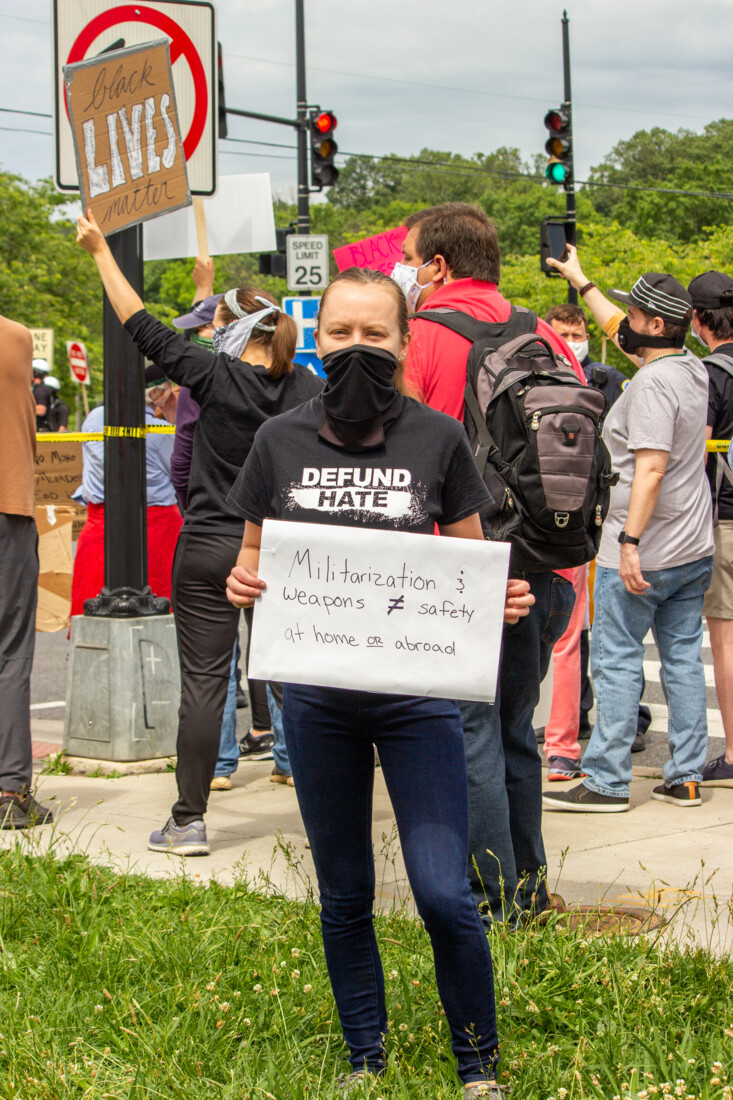
Carl Roose / AFSC
This year, the United States will spend more than $740 billion on weapons and war. That price tag doesn’t even include other ways our taxpayer dollars fund militarized responses in the U.S, like immigration enforcement and mass incarceration.
These misguided budget priorities come at a huge cost, and every day we see that cost firsthand. When our government wastes our tax dollars on war and militarism instead of keeping our communities healthy, we all suffer.
Take F-35 war planes. This year, our representatives in Washington allocated enough money for 96 of them. That’s 17 more than the Pentagon had even asked for. And with each warplane costing an estimated $100 million, the money spent on just one aircraft could have instead paid for:
- Rent for an entire year for more than 73,000 people facing eviction.
- Annual food assistance for nearly 60,000 people.
- Face masks for 100 million people who didn’t have access to protection.
That amount would also cover three years of operating expenses for AFSC’s work in communities worldwide.
The start of a new presidential administration and a new Congress is a critical opportunity for the U.S. to reverse this gross misallocation of our resources—and pass a moral budget to improve the health and well-being of all people. Across the U.S. and around the world, AFSC is working closely with communities and partners on a range of initiatives that demonstrate the difference we can make when we invest in human needs instead of militarism.
Instead of funding war, immigration enforcement, and prisons, we could:
Keep people in their homes.
In Georgia, residents began to face evictions and foreclosures when unemployment skyrocketed last year. We worked with local partners to launch a statewide COVID-19 Housing Emergency hotline, training 100 volunteers to help people negotiate arrangements to stay in their homes. Our efforts will help protect tenants’ rights and make sure people have access to stable housing.
Help farmworkers stay safe and healthy.
Although farmworkers are designated “essential workers,” they are often left behind when it comes to health protections and economic relief. To help meet critical needs in this pandemic, AFSC distributed food, personal protective equipment, and health information to farmworkers in Homestead, Florida. We also partnered with the state health department to bring mobile clinics to farmworker housing villages to provide free COVID-19 testing—reaching more than 2,000 farmworkers.
Improve access to safety net programs.
AFSC has worked for years to make critical benefits like SNAP (food assistance), Medicaid, and unemployment insurance more widely available. In West Virginia, we have successfully advocated for the state to remove time limits, work requirements, and other obstacles to assistance. As this public health crisis continues and after it ends, we will keep working until each person in our country can meet basic needs.
Keep families and communities together.
In immigration proceedings, there is no right to counsel—even for people in detention. Since 1997, AFSC has provided free legal representation to low-income immigrants detained and facing deportation in New Jersey—helping to keep hundreds of families together and protecting due process. As COVID-19 spread through detention centers, our efforts became more urgent than ever to secure the release of as many people as possible. While our ultimate goal is to end detention, the impact of our legal work is clear: We’ve demonstrated that detained immigrants represented by an attorney are more likely to be released and win their case. And we’ve used what we’ve learned to successfully advocate for public funding for universal representation and improved detention conditions.
Create a pathway to citizenship for all immigrants in the U.S.
There are an estimated 11 million undocumented people in the U.S. who are vital parts of our communities—but are denied the opportunity to obtain citizenship in the country they call home. From California to Florida, AFSC has provided support to immigrant-led organizing and advocacy to preserve Temporary Protected Status (TPS) and Deferred Action for Childhood Arrivals (DACA) programs—while calling for a pathway to citizenship for all immigrants. We have helped immigrants and their loved ones bring their stories to elected officials and the media and engage others in demanding a lasting solution for all.
Support restorative justice initiatives to disrupt the school-to-prison pipeline.
In St. Louis, Missouri, AFSC works with Northwest Academy high school to provide alternatives to suspension or expulsion—as part of our work to interrupt the school-to-prison pipeline. Since 2013, we have helped students lead a peer mediation program, which trains students to help their peers resolve conflicts peacefully. We also provide support with other restorative practices that foster an environment where students are empowered and cared for—and if discipline is required, focuses on addressing harms and restoring the student to the community, instead of removing them.
Strengthen communities working to build conditions for peace around the world.
In Somalia, which has faced more than two decades of armed conflict, young people must overcome enormous barriers to support themselves and their families. Since 2015, AFSC has worked with local partners in Somalia to teach young people vocational skills—including carpentry, electrical work, and tailoring—as well as conflict resolution. More than 1,400 people who graduated from our program are now employed or self-employed, and many more are prepared to join the workforce and use their knowledge of peacebuilding and conflict resolution to act as agents of change among their peers.
Your support for AFSC has helped us show how much is possible with the right kind of investment, grounded in respect for human rights and dignity. Thank you for supporting our work with communities around the world.
Drop here!